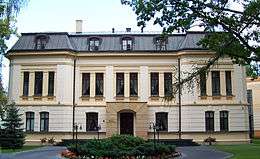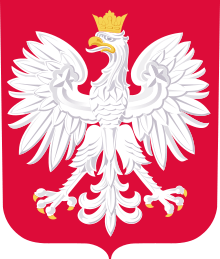Constitutional Tribunal (Poland)
| Constitutional Tribunal | |
|---|---|
| Trybunał Konstytucyjny | |
 | |
| Established |
1982-constitutional amendment establishing the Constitutional Tribunal 1986-the beginning of activity |
| Country | Poland |
| Location | Warsaw |
| Composition method |
Prime ministerial nomination with Sejm RP confirmation President and Vice President appointed by President of the Republic |
| Authorized by | Constitution of the Republic of Poland |
| Judge term length | 9 years, only one term |
| No. of positions | 15 |
| Website |
www |
| President | |
| Currently | Julia Przyłębska (disputed) |
| Since | 21 December 2016 |
| Vice President | |
| Currently | Prof. Stanisław Biernat |
| Since | 3 December 2010 |

 |
|---|
| This article is part of a series on the politics and government of Poland |
|
|
Related topics
|
The Constitutional Tribunal (Polish: Trybunał Konstytucyjny) is the constitutional court of the Republic of Poland, a judicial body established to resolve disputes on the constitutionality of the activities of state institutions; its main task is to supervise the compliance of statutory law with the Constitution of the Republic of Poland. It was established on the 26 March 1982 by the communist government of the People's Republic of Poland after the introduction of martial law, an attempt to crush political opposition.
The Constitutional Tribunal adjudicates on the compliance with the Constitution of legislation and international agreements (also their ratification), on disputes over the powers of central constitutional bodies, and on compliance with the Constitution of the aims and activities of political parties. It also rules on constitutional complaints.
The Constitutional Tribunal is made up of 15 judges chosen by the Sejm RP (the lower house of parliament) for single nine-year terms. The Constitutional Tribunal constitutes one of the formal guarantees of a state grounded on the rule of law.
Three judges, appointed by the President of the Tribunal, serve as members of the National Electoral Commission (Act of 5 January 2011 Electoral Code).
In 2016 Julia Przyłębska, an ally of Law and Justice, was appointed as President of the Constitutional Tribunal. Her appointment has been argued to be unconstitutional because she was appointed directly by the President of the Republic rather than being elected by judges on the Tribunal, as required by Poland's Constitution.
Current Justices
| No. | Term of office | Full name | Comment |
|---|---|---|---|
| 1. | since 6 May 2010 | Prof. Sławomira Wronkowska-Jaśkiewicz[1] | |
| 2. | since 3 December 2010 | Stanisław Rymar | |
| 3. | since 3 December 2010 | Prof. Piotr Tuleja | |
| 4. | since 3 December 2010 | Prof. Marek Zubik | |
| 5. | since 5 January 2011 | Prof. Małgorzata Pyziak-Szafnicka[2] | |
| 6. | since 23 July 2012 | Prof. Leon Kieres | |
| 7. | since 2 December 2015 | Prof. Henryk Cioch | |
| 8. | since 2 December 2015 | Dr. hab Mariusz Muszyński | |
| 9. | since 3 December 2015 | Piotr Pszczółkowski | |
| 10. | since 9 December 2015 | Julia Przyłębska | President of the Tribunal since 21 December 2016 (acting President of the Tribunal 20-21 December 2016). |
| 11. | since 28 April 2016 | Dr. hab. Zbigniew Jędrzejewski | |
| 12. | since 20 December 2016 | Dr. hab. Michał Warciński | |
| 13. | since 27 February 2017 | Dr. hab. Grzegorz Jędrejek | |
| 14. | since 28 June 2017 | Dr. Andrzej Zielonacki | |
| 15. | since 18 September 2017 | Dr. hab. Justyn Piskorski | |
The three judges with term of office 'since 7 November 2015' are disputed : the Sejm appointed them (with two others) before the parliamentary elections of 2015; after these elections, the Sejm invalidated their appointment and elected five new judges in their place. The president denied the serment to the five appointed before the election and swore the five new judges in.
Of the appointments made before the election, the Constitutional Tribunal itself invalidated two (Bronisław Sitek and Andrzej Sokala) and accepted three (Roman Hauser, Krzysztof Ślebzak and Andrzej Jakubecki). As a consequence, of the appointments made after the election, the Tribunal accepted two (Piotr Pszczółkowski and Julia Przyłębska) and invalidated three (Henryk Cioch, Lech Morawski and Mariusz Muszyński). See Polish Constitutional Court crisis, 2015.
See also
References
→ Poland’s ruling party drafts bill to force judges to step down [1]
External links

- Official website
